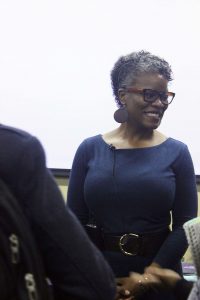Arizona State professor lectures on history of lynching in the US

Ersula J. Ore spoke to a near-capacity crowd of 90 students and faculty Tuesday morning about the history of lynching in America, and the rhetorical power lynching still commands in modern society.
Ore, an assistant professor of African American Studies and Rhetoric at Arizona State University, discussed her upcoming book, “Lynching: Violence, Rhetoric, and American Identity,” for the 2019 Kurt Ritter Lecture in Political Rhetoric. The event was by sponsored by the Texas A&M departments of Africana Studies and Communication.
Today, Ore explained, lynching is a performance of American identity; it is an act of establishing community and rhetoric of civic belonging. Ore said education about the history of lynching is needed to foster hard conversations that will lead to change.
The rhetorical power of lynching explains why “the past is never past,” said Ore.
It started with Charles Lynch, an American revolutionary who set out to punish British Loyalists in colonial America. His actions marked the start of the act known as lynching.
“Lynch’s exoneration and later promotion legitimated lynching as an integral part of American civic life,” Ore said.
Exonerating Lynch and his assistants cast lynching as a legally protected action and made the act an example of the highest citizenly etiquette, Ore said.
“Lynch laws not only secured the borders of America but defined who was and was not a member of the burgeoning new nation,” Ore said. “This violence against British Tories reinforced the new American identity.”
Ore said that while African Americans were a part of Colonial America and indeed lynched, that lynching did not become a practice of anti-Black racism until after the Civil War.
Moving forward in American history, lynching transformed into violent attacks and hate crimes against minority groups, creating a tone of “us versus them” across society.
Ore’s goal through her book is to use historical context in contemporary society to form a dialogue around how lynching continues today. This includes recent history, including the shooting death of Trayvon Martin, a black teenager who was killed in 2012.
Associate dean for inclusive excellence and strategic initiative at A&M Leroy Dorsey said he has written about historical instances of lynching, and appreciated how Ore’s modern example of Trayvon Martin’s death pulled the issue of lynching “into the near present.”
“The opportunity to discuss ideas is how change occurs,” said Dorsey, with education as the key to moving forward.
Sociology doctoral student Jalia Joseph described the lecture as “not what I expected at all” but said she was glad she attended.
“I like how she gave lots of historical content and she provided historical analysis to give us a background,” Joseph said.
—
This article has been updated to include the lecture co-sponsor Texas A&M Department of Africana Studies.
